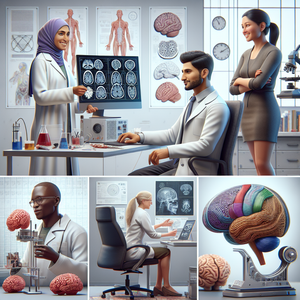
Exploring the Top 20 Careers in Neurobiology: A Gateway to Diverse Opportunities
Neurobiology is a captivating field that unlocks the intricacies of the brain and nervous system, paving the way for a multitude of career paths. Whether you are drawn to research, clinical practice, or technological innovation, neurobiology offers a spectrum of roles that cater to various interests and educational backgrounds. This dynamic discipline intersects with psychology, biology, and healthcare, creating a rich tapestry of opportunities. For instance, EEG technologists utilize electroencephalograms to monitor brain activity, while neuroimaging technicians employ advanced imaging techniques to visualize brain structures. The beauty of neurobiology lies in its inclusivity; aspiring professionals can embark on their journey with a bachelor’s degree or delve deeper into advanced medical training. With an increasing demand for neurobiology experts, those passionate about understanding and treating neurological conditions will find an inviting landscape of career prospects.
Job Summaries:
EEG Technologist:
- Vital for diagnosing neurological disorders
- EEG technologists conduct tests that measure brain activity
- They prepare patients for electroencephalogram procedures
- Apply electrodes
- Ensure equipment is functioning correctly
- Typically requiring a degree in neurobiology or a related field along with certification
- These professionals play a crucial role in guiding treatment strategies.
Neuroscientist:
- Neuroscientists delve into the complexities of the nervous system through research.
- They design experiments, analyze data, and contribute to scientific literature.
- A Ph.D. is often essential for this role, where their discoveries can lead to groundbreaking therapies for neurological conditions.
Neurorehabilitation Manager:
- These managers oversee rehabilitation programs for individuals recovering from neurological injuries.
- They coordinate care teams and tailor treatment plans.
- They often hold a master’s degree in healthcare administration or rehabilitation counseling.
- Their leadership is pivotal in improving patients’ recovery outcomes.
Neuroimaging Technician:
- Using imaging technologies such as MRI and CT scanners, neuroimaging technicians play a critical role in diagnosing neurological issues.
- They prepare patients and ensure the accuracy of imaging results.
- Typically requiring certification in neuroimaging or radiologic technology.
Biological Technician:
- Supporting scientists in neurobiology
- Biological technicians prepare experiments
- Maintain lab equipment
- A bachelor’s degree in biology or a related field is necessary
- Their contributions are essential for advancing research in the nervous system.
Neurosurgeon:
- With extensive training, neurosurgeons perform intricate surgical procedures on the brain, spinal cord, and nerves.
- This demanding career requires a medical degree and residency in neurosurgery, offering the profound ability to change lives through surgery.
Clinical Research Coordinator:
- These coordinators manage clinical trials that investigate treatments for neurological conditions.
- They ensure compliance with regulations and recruit participants.
- Requiring a background in life sciences and experience in clinical research.
Pharmaceutical Sales Representative:
- By educating healthcare providers about new neurological treatments, these representatives play a crucial role in enhancing patient access to medications.
- A strong scientific background and excellent communication skills are essential for success in this position.
Laboratory Technician:
- Conducting tests and analyzing samples
- Laboratory technicians are integral to neurobiology research
- They maintain laboratory equipment
- They ensure accurate data collection
- Typically requiring a degree in biology or a related field
Neuroscience Educator:
- Teaching about the nervous system’s structure and functions
- Neuroscience educators work in high schools or colleges
- They require a degree in neuroscience or education
- Plus teaching credentials
- They are vital in shaping the next generation of scientists
Medical Science Liaison:
- Acting as a bridge between pharmaceutical companies and healthcare professionals
- Medical science liaisons provide critical information on neurological drugs and therapies
- A scientific background and experience in the medical field are essential for this role.
Behavioral Neuroscientist:
- Investigating the links between the nervous system and behavior.
- Behavioral neuroscientists conduct experiments that inform treatment strategies for mental health disorders.
- This field requires a Ph.D. in neuroscience.
Neuropsychologist:
- Assessing and treating cognitive and behavioral issues related to neurological conditions.
- Neuropsychologists hold a doctoral degree in psychology with specialized training in their field.
- Their work is essential for effective patient management.
Research Scientist:
- Focused on various aspects of the nervous system
- Research scientists conduct experiments and publish their findings
- A Ph.D. is typically required
- Their work significantly contributes to medical knowledge.
Regulatory Affairs Specialist:
- Ensuring compliance for medical products related to neurobiology
- Regulatory affairs specialists prepare documentation for regulatory submissions
- A background in science and experience in this area are crucial.
Pharmacologist:
- Pharmacologists study the effects of drugs on the nervous system.
- They develop medications for neurological disorders.
- A Ph.D. is generally necessary to succeed in this important field.
Cognitive Neuroscientist:
- Investigating the neural mechanisms of cognitive processes.
- Cognitive neuroscientists require a Ph.D. and strong research skills.
- Their findings advance understanding of brain function.
- Their findings inform cognitive impairment interventions.
Neuroethics Consultant:
- Analyzing the ethical implications of neurobiological research
- Neuroethics consultants guide ethical practices in the field
- A background in neurobiology and philosophy or ethics is often required.
Clinical Psychologist:
- Focusing on neurobiology
- Clinical psychologists assess and treat mental health disorders linked to brain function
- A doctoral degree in psychology is necessary for this role
- Licensure is necessary for this role
Health Informatics Specialist:
- Managing and analyzing health data related to neurological conditions
- Health informatics specialists use their expertise to enhance patient care
- A degree in health informatics is often required
These diverse career opportunities in neurobiology not only advance the field but also improve patient care and outcomes. For those interested in pursuing a career in neurobiology, exploring current job openings can help align skills and aspirations with the right path. With projected job growth, competitive salaries, and a robust demand for skilled professionals, neurobiology is an enticing field for anyone passionate about science and healthcare.
Explore More Jobs

